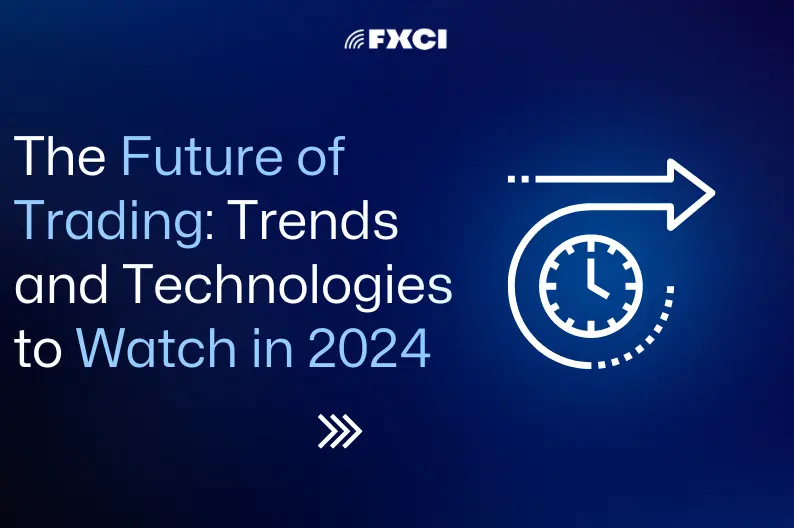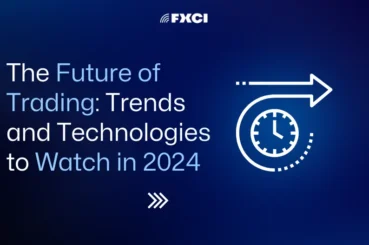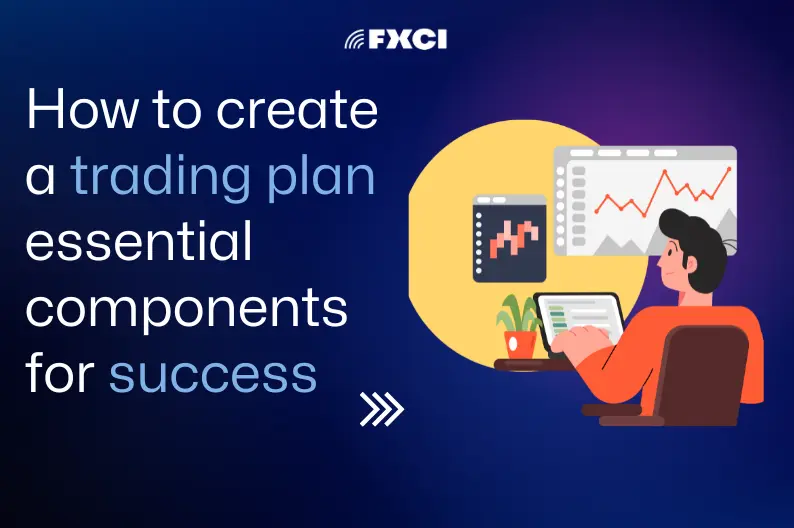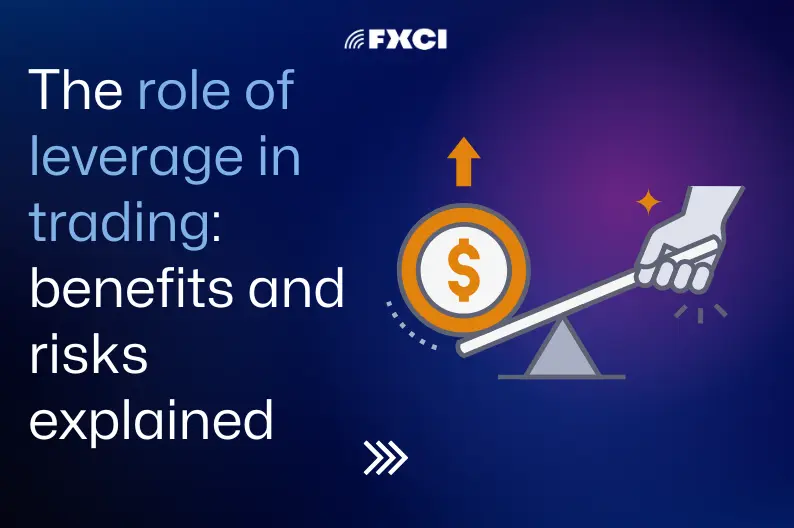
We all know that success in the financial markets requires knowledge and experience, as well as making the right decisions at the right time. However, there is another critical component of success—the ability to use the latest technology and follow significant trends in trading.
Get ready because right now, we are going to tell you about the technologies that will dramatically change your trading in 2024. You will learn about the trends and technologies that will shape the future of trading not only for this year but for all the years to come.
Welcome to the future of trading with FXCI.
Evolution of Trading in the Digital Age
The technology utilized for trading has experienced a substantial transformation, transitioning from the boisterous and disorderly "open outcry" approach of yesteryears to the swift algorithms employed in the present day. In the beginning, traders relied on hand signals and ticker tapes, leading to a sluggish execution process and restricted information availability.
The 70s and 80s marked the emergence of automation, as terminals, data providers, and early algorithmic pioneers laid the foundation for faster and more efficient markets. The '90s saw a significant shift in the world of finance as electronic communication networks (ECNs) emerged to disrupt traditional exchanges, and online brokers opened up trading opportunities to a broader audience.
Currently, we live in the age of rapid-fire algorithms, extensive data analysis, and mobile applications, where trades are completed within milliseconds, and risk management tools play a vital role. In the future, the trading industry will be influenced by personalization, insights powered by AI, and ethical considerations regarding the use of technology.
This continuous transformation has made access more democratic, enhanced efficiency, and driven growth. However, it also brings about challenges, such as ensuring fairness in algorithms and safeguarding data privacy. With the ever-evolving advancements in technology, traders must stay flexible and make the most of the available tools in order to navigate the intricate trends of the financial landscape successfully.
Emerging Trends in Trading
New trends in trading often appear even faster than traders can keep up with them. To keep your finger on the pulse of the market, let's list the prominent trends that are already changing trading for the better.
Rise of Algorithmic Trading
The emergence of cryptocurrencies has led to the development of algorithmic trading strategies designed specifically for digital asset markets. Algorithmic trading in cryptocurrency markets utilizes the fluctuation in prices and the availability of funds to carry out trades on different digital assets. The round-the-clock operation of cryptocurrency markets and the decentralized structure of blockchain technology offer both obstacles and possibilities for algorithmic traders. The emergence of advanced algorithms tailored for the crypto industry is a significant and noteworthy phenomenon, highlighting the increasing significance of digital assets within the broader financial realm.
Growth of Social Trading
Social trading platforms enable traders to observe and even automatically replicate the trading strategies of seasoned traders. This can assist novice traders in acquiring trade skills and gaining experience at an accelerated pace while also providing seasoned traders with the opportunity to impart their expertise and earn additional income by having others adopt their trading strategies. An essential element of social trading is the capability to observe the trades of other traders in real-time. Traders can gain valuable insights and mirror the strategy and decisions of seasoned traders.
Sustainable and ESG Investing
The surge in sustainable investing is rapidly gaining traction. Investors are showing a growing interest in companies that make a positive difference in the world, resulting in a notable surge in ESG stocks.
The value of ESG stocks will likely increase significantly by 2024. The expansion is driven by the government's dedication to sustainability, the rise of the renewable energy industry, and heightened investor consciousness regarding ESG matters.
Choosing to invest in ESG stocks offers the opportunity to generate financial returns while making a positive difference in society and the environment. Nevertheless, it is crucial to thoroughly investigate and examine companies before making any investment decisions. Investing in ESG stocks allows investors to contribute to a better world while also generating financial returns.
Key Technologies Transforming Trading
Artificial Intelligence and Machine Learning
Over the past decade, the investment landscape has undergone a significant transformation thanks to the advancements in Artificial Intelligence (AI) and Machine Learning (ML). The remarkable capacity of AI and ML algorithms to analyze immense volumes of data and uncover intricate patterns and connections that elude human perception has brought about a profound transformation in investment strategies worldwide. This technology has empowered investors to make more knowledgeable choices and seize opportunities in the market. The influence of AI and ML on investment strategies is evident in a wide range of asset categories, such as stocks, bonds, commodities, and currencies.
One of the significant advantages of incorporating AI and ML into investment strategies is the capacity to swiftly analyze extensive datasets, surpassing the capabilities of a human. Using this advanced technology, investors can uncover hidden patterns and trends that may go unnoticed by the human eye. As an illustration, machine learning algorithms can examine social media posts, news articles, and other unstructured data sources in order to detect sentiment and forecast market trends.
Another advantage of incorporating AI and ML into investment strategies is the capacity to recognize and minimize potential risks. Machine learning algorithms can analyze past data to detect patterns and connections that may result in negative outcomes. This technology can also be utilized to construct models that replicate market conditions to forecast portfolio performance in various scenarios.
Blockchain and Cryptocurrencies
The advent of blockchain technology has completely transformed the landscape of global trading and investment. Thanks to its decentralized and secure nature, blockchain technology has revolutionized cross-border transactions and significantly enhanced transparency in the global financial system.
One of the main advantages of blockchain technology in trading and investments is its capacity to remove intermediaries and lower transaction expenses. Through the utilization of smart contracts, investors can engage in direct trading with one another, eliminating the necessity for conventional brokers or clearinghouses. This not only expedites the trading process but also minimizes the likelihood of fraud and human error.
In addition, the use of blockchain technology has facilitated the accessibility of global markets that were previously inaccessible to investors. With tokenized assets, investors have the opportunity to acquire portions of real estate, commodities, and various other assets from across the globe, all while avoiding the hassle of intricate documentation and exorbitant fees. This has opened up the investment landscape and enabled individual investors to broaden their portfolios with greater ease.
In addition, the use of blockchain technology has enhanced the visibility and protection of global transactions. Through the use of a public ledger, blockchain guarantees that all participants can confirm the legitimacy of the transaction by documenting every trade. This minimizes the possibility of fraudulent activities and enhances the level of confidence among investors and traders, particularly in markets plagued by widespread corruption.
Big Data Analytics
Big data is the term used to describe the vast amount of diverse information produced on a daily basis from a wide range of sources. Users or basic office software are unable to handle such vast amounts of data for processing and analysis, so a wide range of advanced technologies specifically developed for handling it exist.
The package usually consists of instruments for gathering, storing, prepping, purifying, and examining data. Traders rely on cloud computing and distributed databases to gather and store vast quantities of data. Prior to analysis, traders preprocess and cleanse the data to eliminate any unwanted noise or inconsistencies using various techniques, such as normalization and identifying outliers.
When it comes to forex trading, big data encompasses a wide range of information, such as market statistics, economic indicators, social media sentiment, news articles, and other relevant data sources. The impact of large-scale data in the forex market is immense. By utilizing analytics, traders can choose pertinent and promising assets, enabling them to make well-informed trading choices and ultimately gain a competitive edge.
Quantum Computing
Quantum computing operates on the fundamental principles of quantum mechanics, harnessing quantum bits or qubits that can exist in numerous states simultaneously. The phenomenon of superposition, in addition to entanglement and quantum interference, enables quantum computers to execute intricate computations at speeds that greatly surpass those of classical computers.
The advantages this technology offers to traders:
- Enhanced prediction models: Quantum computing can handle vast quantities of data and execute intricate calculations at a rapid pace, resulting in the creation of exact forecasting models. These models can analyze market trends, historical data, and a range of economic indicators in order to generate precise market forecasts.
- Enhancement of trading strategies: Quantum algorithms can enhance trading strategies by simultaneously assessing numerous scenarios and potential outcomes. This feature enables traders to recognize the most lucrative strategies and modify them in real time according to market conditions.
- Improving Risk Management: The utilization of quantum computing has the potential to enhance risk management through the provision of superior modeling and stress tests. By conducting a comprehensive analysis of various risk factors and market conditions, traders are able to enhance their risk management strategies and make them more resilient.
- Portfolio Optimization: Utilizing quantitative algorithms can enhance portfolio optimization by concurrently assessing numerous combinations of assets and their interrelationships. This allows for the development of more effective and varied portfolios that have the potential to generate greater returns while maintaining a specific level of risk.
The Impact of Regulation on Future Trading
In the future, as technology continues to advance and the world becomes more interconnected, there will likely be a need for regulatory changes. An exciting development in regulatory processes is the increasing incorporation of cutting-edge technologies such as blockchain and artificial intelligence. This has the potential to improve surveillance capabilities, giving regulators more effective tools to monitor and enforce compliance. Now, let's delve into a few up-and-coming patterns that are outlined below:
- Regulating Cryptocurrencies: The regulation of cryptocurrency is expected to change as digital assets become increasingly incorporated into conventional financial systems. Authorities could potentially establish more defined structures to encourage the broader acceptance of digital currencies.
- Ensuring ESG Compliance: Investors' increasing interest in investments that align with environmental, social, and governance (ESG) criteria will impact regulatory standards. Exchanges and issuers might encounter heightened obligations to reveal ESG-related data.
- Digital Securities and Tokenization: With asset tokenization's increasing popularity, regulations may be developed to specifically address the distinct characteristics of digital securities. Regulators have the power to set forth rules governing the trading and issuance of tokenized assets.
- Emphasize the Prevention of Market Manipulation: Regulators could potentially embrace more sophisticated surveillance methods to safeguard against market manipulation. Artificial intelligence and machine learning can be utilized to analyze trading patterns and identify anomalies.
- Enhanced Collaboration Across Borders: Engaging in trade across borders has the potential to foster greater cooperation between regulatory bodies. Regulatory collaboration seeks to tackle the issues presented by international markets and guarantee uniform supervision.
Predictions for 2024 and Beyond
Acquiring knowledge from industry professionals in the most lucrative sectors of the future is crucial for comprehending patterns and making well-informed choices. According to predictions from top experts:
John Smith, Innovative Technologist
Technology will remain the dominant factor in the upcoming five years. Artificial intelligence has the ability to improve business processes and elevate customer experiences.
Stay vigilant for the groundbreaking potential of augmented reality (AR) and virtual reality (VR) in a wide range of industries.
Sarah Lewis, Financial Specialist
DeFi is genuinely revolutionary. As cryptocurrencies continue to gain widespread acceptance, it is crucial to monitor regulatory advancements closely.
AI will inevitably be integrated into investment and risk management for predictive analytics.
Alex Turner, an expert in the field of cybersecurity
With our growing reliance on technology, the importance of safeguarding our digital lives cannot be overstated. In the coming years, the implementation of cybersecurity protocols will significantly increase.
Preparing for the Future of Trading
As the market changes, Forex traders must continually learn. Economic, political, and social variables affect the forex market and produce price volatility. By studying and remaining current, traders can react to shifting market circumstances and make educated trading decisions.
Continuous learning also enhances traders' fundamental and technical analysis, risk management, and trading psychology skills. It helps traders strengthen their abilities, tactics, and profits.
Continuous learning enhances trading skills in many ways. First and foremost, it helps traders keep up with market movements. By frequently reviewing market news, economic calendars, and expert analysis, traders may spot trading opportunities and make better judgments.
Continuous learning also helps traders master technical analysis tools and indicators. Technical analysis helps traders see market patterns, anticipate price changes, and find entry and exit points. By learning technical analysis, traders can improve their methods and accuracy.
Continuous learning also aids traders in risk management. To limit losses and safeguard wealth, traders must grasp risk management tactics, including stop-loss and take-profit levels. Continuous learning helps traders comprehend risk management basics like position size and diversification.
Following market news and analysis
Forex traders must follow market news and analysis to stay ahead. Traders should check economic calendars for future events, announcements, and indications that might affect currency prices.
It is also important to follow reliable financial news and market commentary. Bloomberg, CNBC, and Reuters cover financial markets and provide professional analysis. Expert and market commentary can help traders gain perspective and make better trading decisions.
Twitter and LinkedIn provide traders with real-time market information and insights. Many expert traders and analysts post on social media, providing helpful information for trading decisions. Before trusting social media information, check the sources' authenticity and competence.
Keep up with market news and research to adapt your trading strategy to shifting market circumstances and capitalize on trading chances. Forex trading requires constant learning and awareness.
Conclusion
Taking into account everything said in this article, it becomes clear that old technologies, which gave excellent results a few years ago, are becoming a thing of the past and losing their effectiveness. Today, we are on the threshold of new technologies in trading, such as the growth of algorithmic trading, significant growth of social trading, artificial intelligence and blockchain technologies, ESG investing, and many others. And we should be ready for this future now. The key is to maximize valuable information in a rapidly changing trading landscape to remain competitive in 2024.
We appreciate your interest in this topic. To be even better prepared for the future of trading, be sure to read the new materials on our blog. We wish you success in trading and look forward to seeing you soon.





